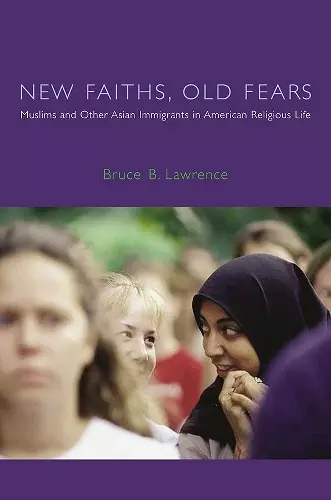New Faiths, Old Fears
Muslims and Other Asian Immigrants in American Religious Life
Format:Hardback
Publisher:Columbia University Press
Published:6th Dec '02
Currently unavailable, and unfortunately no date known when it will be back

As a result of immigration from Asia in the wake of the passage of the 1965 Hart-Celler Immigration Act, the fastest-growing religions in America-faster than all Christian groups combined-are Islam, Hinduism, Buddhism, and Sikhism. Now a leading scholar asks how these new faiths have changed or have been changed by the pluralist face of American civil society and by the deep-rooted American ambivalence toward foreign traditions.
As a result of immigration from Asia in the wake of the passage of the 1965 Hart-Celler Immigration Act, the fastest-growing religions in America - faster than Christian groups combined - are Islam, Hinduism, Buddhism, and Sikhism. This book asks how these faiths have changed or have been changed by the pluralist face of American civil society.As a result of immigration from Asia in the wake of the passage of the 1965 Hart-Celler Immigration Act, the fastest-growing religions in America-faster than all Christian groups combined-are Islam, Hinduism, Buddhism, and Sikhism. In this remarkable book, a leading scholar of religion asks how these new faiths have changed or have been changed by the pluralist face of American civil society. How have these new religious minorities been affected by the deep-rooted American ambivalence toward foreign traditions? Bruce Lawrence casts a comparativist eye on the American religious scene and explores the ways in which various groups of Asian immigrants have, and sometimes have not, been integrated into the American polity. In the process, he offers several important correctives. Too often, Lawrence argues, profiles of Asian American experience focus exclusively on immigrants from East Asia, to the exclusion of South Asian and West Asian voices.New Faiths, Old Fears seeks to make all Asians equally important and to break free of traditional geographic markers, most reflecting nineteenth-century imperial values, that artificially divide the people of the "Middle East" from the rest of Asia, with whom they share certain religious and cultural ties. Iranian Americans, in particular, emerge as a vital bridge group whose experience tells us much about how Asians of many different backgrounds have found their way in their new nation. Beyond simply expanding and refining our conception of who Asian Americans are, Lawrence draws instructive comparisons between Asian Americans' experience and those of Native, African, and Hispanic Americans, exposing undercurrents of racial and class antagonisms. He concludes that we cannot fully comprehend the contours and valences of culture and religion in America without understanding how this racialized class prejudice shapes the views of the dominant class toward immigrants and other marginal groups.
[Lawrence] speaks at length on the social, political, and religious tensions within American culture today... recommended. Choice Bruce Lawrence concludes his thought-provoking essay with a powerful critique of multicultural approaches that ignore divergencies within religious traditions... -- Malise Ruthven Times Literary Supplement a compelling, informed critique and analysis that should provoke citizens to a finer citizenship -- James L. Peacock Journal of the American Academy of Religion an inventive and timely exploration of contemporary American religion, politics, and culture, and exploration that will surely stimulate further research and discussion -- Karen Leonard History of Religions This book not only fills in some key theoretical gaps, but also offers new and hopeful models for conceiving of American diversity. American Journal of Islamic Social Sciences
ISBN: 9780231115209
Dimensions: unknown
Weight: unknown
192 pages